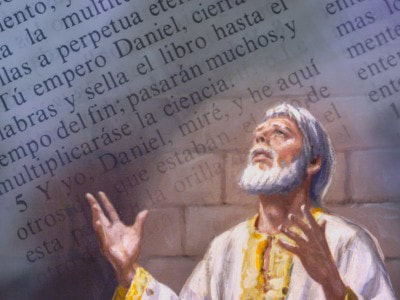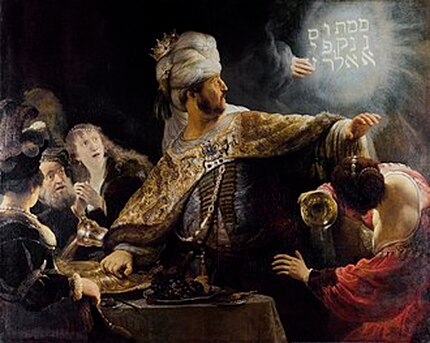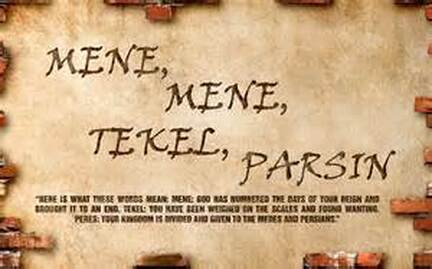When Nebuchadnezzar died he was succeeded by his son Amel Marduk (Evil-Merodach - 2 Kings 25:27-30), who was then succeeded within two years by Nergal-shar-usur (Jeremiah 39:3; Jeremiah 39:13), Nebuchadnezzar’s son-in-law. He only survived for four years and died leaving on the throne a son, who was a minor, Labashi-Marduk, and within a short while this son had been replaced by Nabonidus, possibly the scion of a noble family of Aramaean stock in Haran, who seized the throne with the help of disaffected people and cemented his position by marrying the daughter of Nebuchadnezzar, who bore him a son named Bel-shar-usur (Belshazzar).
Nabonidus eventually left his son Belshazzar, Nebuchadnezzar’s grandson, to hold the reins of kingship, first in order to conduct campaigns elsewhere, including Arabia, and then in order to spend his time in the city of Teima in Arabia possibly pursuing the study of astrology. He also refused to pay due deference to Marduk, absenting himself for long periods from the Babylonian akitu festival, to the anger of the priests who certainly regarded him with hostility. He favoured the moon god, Sin, rebuilding his temple in Haran. He was also an antiquarian. However, he may in fact have suffered from ulcers as tradition suggests (The prayer of Nabonidus from Qumran), and that would help to explain his retirement, and the remainder may simply have been due to his ‘scholarly’ nature and dislike of functions, which would have been interpreted as ‘odd’, if not worse.
Thus his son ruled for many years in Babylon as a junior co-regent, with the powers, if not the name, of kingship. The title of ‘sharru’ (overall king) was never applied to him and he was rather entitled officially ‘mar sharri’ (son of the overall king). But the title melek (king) was regularly applied to under-kings, and Belshazzar could thus be called ‘melek of Babylon’.
Nabonidus returned to his duties in the last part of his reign and just prior to this incident, was defeated by the forces of Cyrus at Sippar, and fled. At this time Belshazzar was still ruling in Babylon at the time this chapter commences. (Nabonidus later returned to Babylon and was captured).
Daniel 5:1-4 GNT One night King Belshazzar invited a thousand noblemen to a great banquet, and they drank wine together. While they were drinking, Belshazzar gave orders to bring in the gold and silver cups and bowls which his father Nebuchadnezzar had carried off from the Temple in Jerusalem. The king sent for them so that he, his noblemen, his wives, and his concubines could drink out of them. At once the gold cups and bowls were brought in, and they all drank wine out of them and praised gods made of gold, silver, bronze, iron, wood, and stone.
Belshazzar was the grandson of Nebuchadnezzar. The word translated does not strictly mean ‘father’. It means ‘one through whom you trace your lineage.
When Nebuchadnezzar died he was succeeded by his son
2 Kings 25:27 GNT In the year that Evil-merodach (Amel Marduk) became king of Babylonia, he showed kindness to King Jehoiachin of Judah by releasing him from prison. This happened on the twenty-seventh day of the twelfth month of the thirty-seventh year after Jehoiachin had been taken away as prisoner.
who was then succeeded within two years by Nergal-shar-usur, Nebuchadnezzar’s son-in-law.
Jeremiah 39:3 GNT When Jerusalem was captured, all the high officials of the king of Babylonia came and took their places at the Middle Gate, including Nergal Sharezer, Samgar Nebo, Sarsechim, and another Nergal Sharezer.)
He only survived for four years and died leaving on the throne a son, who was a minor, Labashi-Marduk, and within a short while this son had been replaced by Nabonidus, who seized the throne and cemented his position by marrying the daughter of Nebuchadnezzar, who bore him a son named Bel-shar-usur (Belshazzar).
This gathering took place while the city of Babylon, which at the time, was surrounded by enemies, for the Medo-Persians had invaded Babylonia under one of Cyrus’ generals named Ugbaru, and the city was virtually under siege.
The scripture doesn’t say why Belshazzar brought out the sacred vessels, which Nebchadnezzar had taken from the Temple just that he did it.
He seemingly knew of them and no doubt persuaded himself in his drunken stupor that it was time they were used. It was probably his means of declaring the power of Babylon, and possibly his own defiance of a God. The fact that they were sacred vessels suggests that this was a direct act of blasphemy.
The blasphemy of the situation is starkly brought out. We cannot doubt the intent of the king. The golden vessels were those connected with the sanctuary itself
Daniel 1:1-2 GNT In the third year that Jehoiakim was king of Judah, King Nebuchadnezzar of Babylonia attacked Jerusalem and surrounded the city. The Lord let him capture King Jehoiakim and seize some of the Temple treasures. He took some prisoners back with him to the temple of his gods in Babylon, and put the captured treasures in the temple storerooms.
His act was an insult to the God of Israel, perhaps a deliberate slight on the God Who had so influenced Nebuchadnezzar, who had seemingly never used the vessels in such a way.
Daniel 5:5-6 GNT Suddenly a human hand appeared and began writing on the plaster wall of the palace, where the light from the lamps was shining most brightly. And the king saw the hand as it was writing. He turned pale and was so frightened that his knees began to shake.
Excavation has revealed that the walls of the Babylonian palace were covered with white plaster so that any dark object would be highlighted against it in the light from the lamps. The king is the only one mentioned as seeing the hand that wrote.
You can imagine that this guy who is drunk when he sees this freaks out. Like seeing a pink elephant.
The effect on the king was dramatic. He was absolutely terrified. This serves to confirm that his attitude was one of deliberate blasphemy, for he now recognised that the God Whom he had been blaspheming was here to deal with him.
Daniel 5:7-9 GNT He shouted for someone to bring in the magicians, wizards, and astrologers. When they came in, the king said to them, “Anyone who can read this writing and tell me what it means will be dressed in robes of royal purple, wear a gold chain of honor around his neck, and be the third in power in the kingdom.” The royal advisers came forward, but none of them could read the writing or tell the king what it meant. In his distress King Belshazzar grew even paler, and his noblemen had no idea what to do.
Like his grandfather Belshazzar, called in the wise men of Babylon. He needed somebody to tell him what this all meant the hand that came out of nowhere and wrote a message of some kind. He offered a great reward to the person or persons who could help him. To be clothed in purple was to be treated royally. It suggested that the person was to be made of exalted rank.
None of the wise men of Babylon were able to read and decipher the writing. The result was that the king, who had probably sobered up by now really got nervous. Nobody could read the writing much less tell him what it meant.
Mom comes to the rescue.
The mother would have been Nebuchadnezzar’s daughter. She remembered that great Daniel has helped her father, by interpreting two dreams for him and who had become a trusted adviser of Nebuchadnezzar. She was concerned for her grandson So she told him about Daniel. She said that he was a man full of the spirit of the holy gods, and that he had deep understanding and wisdom, and light where there was darkness for others. Indeed because of these things Nebuchadnezzar had made him master of the wise men. He could interpret dreams, explain things that others couldn’t. He was just the man to help Belshazzar.
It may be asked why Daniel did not enter with the wise men. The answer is probably that he had been replaced as master of the wise men, after Nebuchadnezzar died. Just like each newly elected President of Governor brings in his own people.
He had thus seemingly been honourably retired, or given a position of lesser authority.
But they needed him now because he had the spirit of the holy gods in him. He has unusual ability and is wise and skillful in interpreting dreams, solving riddles, and explaining mysteries
Daniel 5:13-16 GNT Daniel was brought at once into the king's presence, and the king said to him, “Are you Daniel, that Jewish exile whom my father the king brought here from Judah? I have heard that the spirit of the holy gods is in you and that you are skillful and have knowledge and wisdom. The advisers and magicians were brought in to read this writing and tell me what it means, but they could not discover the meaning. Now I have heard that you can find hidden meanings and explain mysteries. If you can read this writing and tell me what it means, you will be dressed in robes of royal purple, wear a gold chain of honor around your neck, and be the third in power in the kingdom.”
You notice that Belshazzar used his Hebrew name and not his Babaloian name Belteshazzar. Also notice that Belshazzar continues to butter him up by emphasizing Daniel’s qualities. “ I have heard that the spirit of the holy gods is in you and that you are skillful and have knowledge and wisdom.”
Note also the continual emphasis on Daniel’s qualities. All who read them knew that this was because God was with him. It was not glorifying Daniel but God, for God was the source of all his wisdom. And the same promise of high reward was given to him, if he could only solve the meaning of the writing.
Daniel 5:17-21 GNT Daniel replied, “Keep your gifts for yourself or give them to someone else. I will read for Your Majesty what has been written and tell you what it means. “The Supreme God made your father Nebuchadnezzar a great king and gave him dignity and majesty. He was so great that people of all nations, races, and languages were afraid of him and trembled. If he wanted to kill someone, he did; if he wanted to keep someone alive, he did. He honored or disgraced anyone he wanted to. But because he became proud, stubborn, and cruel, he was removed from his royal throne and lost his place of honor. He was driven away from human society, and his mind became like that of an animal. He lived with wild donkeys, ate grass like an ox, and slept in the open air with nothing to protect him from the dew. Finally he admitted that the Supreme God controls all human kingdoms and can give them to anyone he chooses.
Daniel politely states that he wishes for no reward. He is not here to benefit from what he is about to do.
Daniel reminded him that his grandfather Nebuchadnezzar was far, far greater than him. He had total control, the power of life and death over his whole empire, and the power to give honour or to remove honour which really counted for something.
But he had too great an opinion of himself and his own importance, and because of it he lost both his throne and his glory. We talked about that last week. In the end Neb learned that the Most High rules in the kingdom of men, and hands it over wherever it pleases Him.
Daniel 5:22-24 GNT “But you, his son, have not humbled yourself, even though you knew all this. You acted against the Lord of heaven and brought in the cups and bowls taken from his Temple. You, your noblemen, your wives, and your concubines drank wine out of them and praised gods made of gold, silver, bronze, iron, wood, and stone—gods that cannot see or hear and that do not know anything. But you did not honor the God who determines whether you live or die and who controls everything you do. That is why God has sent the hand to write these words.
What we need to understand is that what Daniel said and the way he said it would under normal circumstances ensured his execution. Daniel told him that he had done things even worse than those done by Nebuchadnezzar.
Daniel told him that he had no excuse because he know what happened to his grandfather. Instead of being humble before the God of heaven he had deliberately blasphemed His name, he had arrogantly and deliberately used the utensils in order to insult Him, and had not only allowed his drunk guests, wives and concubines to drink wine from them, but had used them for the worship of mindless, blind, deaf images made of earthly metals by man.
The implication is that these gods were thus in contrast to the Lord of heaven, He Who was the living God, Who was the source of men’s breath. God sees and hears everything and He had seen and heard what Belshazzar had done. His crime was greater than Nebuchadnezzar’s. And yet what folly. It had all been against the One Who held his life in His hands, the One Who had given him breath and could just as easily take it away, and he had done it in order to worship those who could do neither. What then could he expect this message to mean?
Daniel 5:25-28 GNT “This is what was written: ‘Number, number, weight, divisions.’ And this is what it means: number, God has numbered the days of your kingdom and brought it to an end; weight, you have been weighed on the scales and found to be too light; divisions, your kingdom is divided up and given to the Medes and Persians.”
The reason the hand came to write the message was because that the hand came because of the treatment of the holy vessels. The writing itself states that it came from God Almighty (the Most High). We don’t know what language if any known language at all the writing was so the only alternative is to read and interpret it as it is given in Daniel. Transliterated it would be M’N’M’N’TKLUPRSN.
If the writing was Aramaic we can see Daniel’s interpretation.
M’N’ comes from the root to ‘count’ or ‘number’, thus meaning ‘It is numbered’. Daniel interprets it as ‘God has numbered your kingdom and brought it to an end’, meaning that God has determined the days of its length and has thus brought it to a conclusion. The repetition of Mene confirms that the fulfilment is certain and sure. Thus Belshazzar learned that his kingdom was finished.
TKL comes from the root to ‘weigh’. Thus ‘It is weighed’. Daniel interprets it as meaning ‘you have been weighed in the balances and have been found wanting’
Psalm 62:9 GNT Human beings are all like a puff of breath; great and small alike are worthless. Put them on the scales, and they weigh nothing; they are lighter than a mere breath.
Thus Belshazzar learned that God had passed judgment on him and that he had failed the test. This was why his kingdom was finished, because morally and religiously he had proved unworthy.
PRSN comes from two possible roots, ‘peres’ meaning ‘it is divided’ (‘parsin’ is the dual or the plural), and ‘paras’ which means Persians. Daniel therefore interprets ‘your kingdom is divided (peres) and given to the Medes and the Persians (paras).’ The idea of ‘divided’ is not that the kingdom will be divided into two, but the empire would be destroyed. It is important to note that the writing according to Daniel only speaks of the Persians By ‘the Medes and the Persians’ Daniel means the Persian empire. The writing speaks of one Persian empire under Cyrus, made up of the Medes and the Persians, that will divide up among its men the spoils of Babylon, and dissolve the universality of the Babylonian empire.
Daniel 5:29 GNT Immediately Belshazzar ordered his servants to dress Daniel in a robe of royal purple and to hang a gold chain of honor around his neck. And he made him the third in power in the kingdom.
Belshazzar was faithful to his oath. He gave Daniel all the honours that he had promised, and his status was proclaimed within the banqueting hall where were gathered the leading lords of the realm, together with the wise men called earlier. He probably did not realise quite how soon the prophecy would be fulfilled, for while Belshazzar and his lords sang on, celebrating Daniel’s appointment as men will, Cyrus’ general Ugbaru was unknown to them diverting the river Euphrates that ran through Babylon into an ancient lake, so that his soldiers could enter the city along the partly dried up river bed. The city was taken almost without a fight. The Persians were in fact probably welcomed by the priests of Marduk who were sick and tired of their god being largely ignored, and the people woke up to find them in charge of the city.
Daniel 5:30-31 GNT That same night Belshazzar, the king of Babylonia, was killed; and Darius the Mede, who was then sixty-two years old, seized the royal power.
The king was probably slain in what fighting there was.



 RSS Feed
RSS Feed